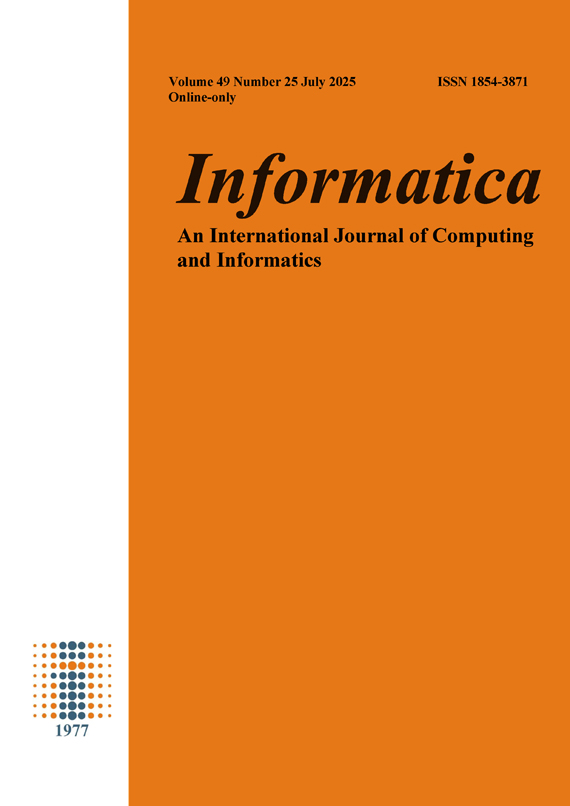Multi-Objective Resource Allocation in Edge Computing Using Improved Genetic Algorithm with Knowledge-Based Crossover and Segmentation Mutation
Abstract
With the widespread adoption of edge computing technology, efficient resource allocation becomes an urgent problem to be solved. Aiming at the optimization of resource allocation in the edge computing environment, a multi-objective optimization function with three dimensions of time, energy consumption, and computing resource occupation is constructed. An improved genetic algorithm resource allocation strategy model based on a knowledge-guided cross-segmentation mutation mechanism is proposed. Knowledge crossover enhances the global search capability by prioritizing the retention of gene segments with higher historical fitness contributions. The experimental results showed that the loss function value of the new model could be as low as 0.012 during the training process, indicating that the model convergence on multi-objective optimization was effectively improved. Meanwhile, the improved genetic algorithm model generated an average of 4.8 optimal solutions, which was 1.8 more than the traditional genetic algorithm which generated an average of 3.0 optimal solutions. Compared with multi-objective optimization algorithms such as NSGA-II, SPEA, and MOPSO, the research model reduced the average energy consumption of the device to 112.68 Joules and the average energy consumption of the system to 208.12 Joules in the EdgeDroid dataset. Its utilization of computational resources reached 77.45%, with the processing time of the task shortened to 5.44 seconds. In real application scenarios, the model achieved a 92.1% and 89.2% task completion rate in shopping malls and hospital environments, and the resource utilization rate was improved to 83.49% and 81.67%. In summary, the proposed method effectively improves resource allocation efficiency, reduces system energy consumption, and optimizes task completion performance, which provides strong support for dynamic resource management in edge computing environments.References
Tan T, Zhao M, Zeng Z. Joint offloading and resource allocation based on UAV-assisted mobile edge computing. ACM Transactions on Sensor Networks (TOSN), 2022, 18(3): 1-21.
Deng C, Fang X, Wang X. UAV-enabled mobile-edge computing for AI applications: Joint model decision, resource allocation, and trajectory optimization. IEEE Internet of Things Journal, 2022, 10(7): 5662-5675.
Mohajer A, Daliri M S, Mirzaei A, Ziaeddini A, Nabipour M, Bavaghar M. Heterogeneous computational resource allocation for NOMA: Toward green mobile edge-computing systems. IEEE Transactions on Services Computing, 2022, 16(2): 1225-1238.
Jiang H, Dai X, Xiao Z, Lyengar A. Joint task offloading and resource allocation for energy-constrained mobile edge computing. IEEE Transactions on Mobile Computing, 2022, 22(7): 4000-4015.
Chai F, Zhang Q, Yao H, Xin X, Gao R, Guizani M. Joint multi-task offloading and resource allocation for mobile edge computing systems in satellite IoT. IEEE Transactions on Vehicular Technology, 2023, 72(6): 7783-7795.
Liu Q, Mo R, Xu X, Ma X. Multi-objective resource allocation in mobile edge computing using PAES for Internet of Things. Wireless networks, 2024, 30(5): 3533-3545.
Sarrafzade N, Entezari-Maleki R, Sousa L. A genetic-based approach for service placement in fog computing. The Journal of Supercomputing, 2022, 78(8): 10854-10875.
Chakraborty S, Mazumdar K. Sustainable task offloading decision using genetic algorithm in sensor mobile edge computing. Journal of King Saud University-Computer and Information Sciences, 2022, 34(4): 1552-1568.
Apinaya Prethi K N, Sangeetha M. A multi-objective optimization of resource management and minimum batch VM migration for prioritized task allocation in fog-edge-cloud computing. Journal of Intelligent & Fuzzy Systems, 2022, 43(5): 5985-5995.
Fan W, Liu J, Hua M, Wu F, Liu Y. Joint task offloading and resource allocation for multi-access edge computing assisted by parked and moving vehicles. IEEE Transactions on Vehicular Technology, 2022, 71(5): 5314-5330.
Gabi D, Dankolo N M, Muslim A A. Dynamic scheduling of heterogeneous resources across mobile edge-cloud continuum using fruit fly-based simulated annealing optimization scheme. Neural Computing and Applications, 2022, 34(16): 14085-14105.
Djigal H, Xu J, Liu L, Zhang Y. Machine and deep learning for resource allocation in multi-access edge computing: A survey. IEEE Communications Surveys & Tutorials, 2022, 24(4): 2449-2494.
Ding C, Wang J B, Zhang H, Lin M, Li G Y. Joint MIMO precoding and computation resource allocation for dual-function radar and communication systems with mobile edge computing. IEEE Journal on Selected Areas in Communications, 2022, 40(7): 2085-2102.
Chen J, Xing H, Lin X, Nallanathan A, Bi, S. Joint resource allocation and cache placement for location-aware multi-user mobile-edge computing. IEEE Internet of Things Journal, 2022, 9(24): 25698-25714.
Jia M, Zhang L, Wu J, Guo Q, Gu X. Joint computing and communication resource allocation for edge computing towards Huge LEO networks. China Communications, 2022, 19(8): 73-84.
Li Y, Yang B, Wu H, Han Q. Joint offloading decision and resource allocation for vehicular fog-edge computing networks: A contract-stackelberg approach. IEEE Internet of Things Journal, 2022, 9(17): 15969-15982.
Zhou H, Wu T, Chen X, He S. Reverse auction-based computation offloading and resource allocation in mobile cloud-edge computing. IEEE Transactions on Mobile Computing, 2022, 22(10): 6144-6159.
Singh G, Chaturvedi A K. Hybrid modified particle swarm optimization with genetic algorithm (GA) based workflow scheduling in cloud-fog environment for multi-objective optimization. Cluster Computing, 2024, 27(2): 1947-1964.
Wen J, Yang J, Wang T. Energy-efficient task allocation for reliable parallel computation of cluster-based wireless sensor network in edge computing. Digital Communications and Networks, 2023, 9(2): 473-482.
Gheisari M, Hamidpour H, Liu Y, Saedi P, Raza A, Jalili A, Rokhsati H, Amin R. Data mining techniques for web mining: A survey. Artificial Intelligence and Applications, 2023, 1(1): 3-10.
DOI:
https://doi.org/10.31449/inf.v49i25.7965Downloads
Published
How to Cite
Issue
Section
License
Authors retain copyright in their work. By submitting to and publishing with Informatica, authors grant the publisher (Slovene Society Informatika) the non-exclusive right to publish, reproduce, and distribute the article and to identify itself as the original publisher.
All articles are published under the Creative Commons Attribution license CC BY 3.0. Under this license, others may share and adapt the work for any purpose, provided appropriate credit is given and changes (if any) are indicated.
Authors may deposit and share the submitted version, accepted manuscript, and published version, provided the original publication in Informatica is properly cited.









